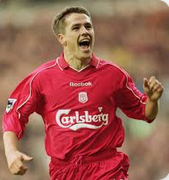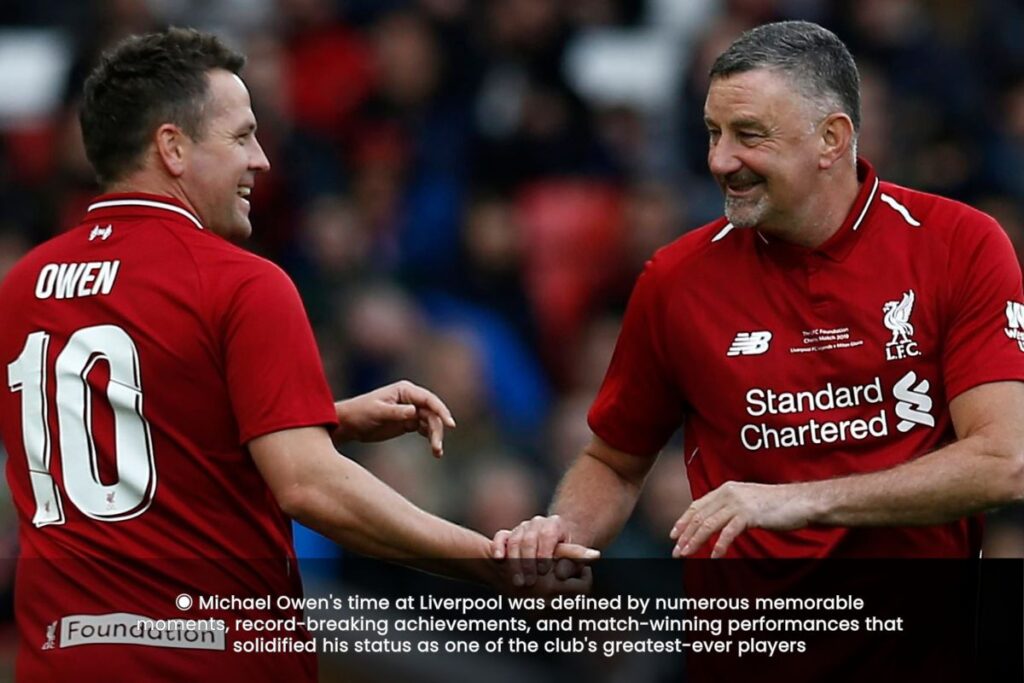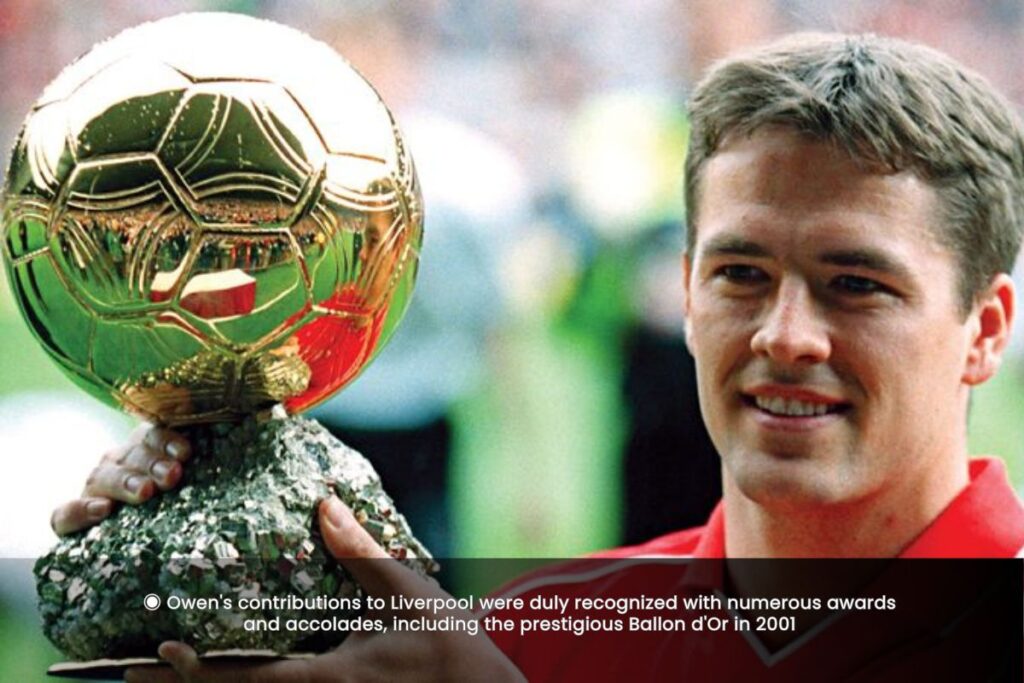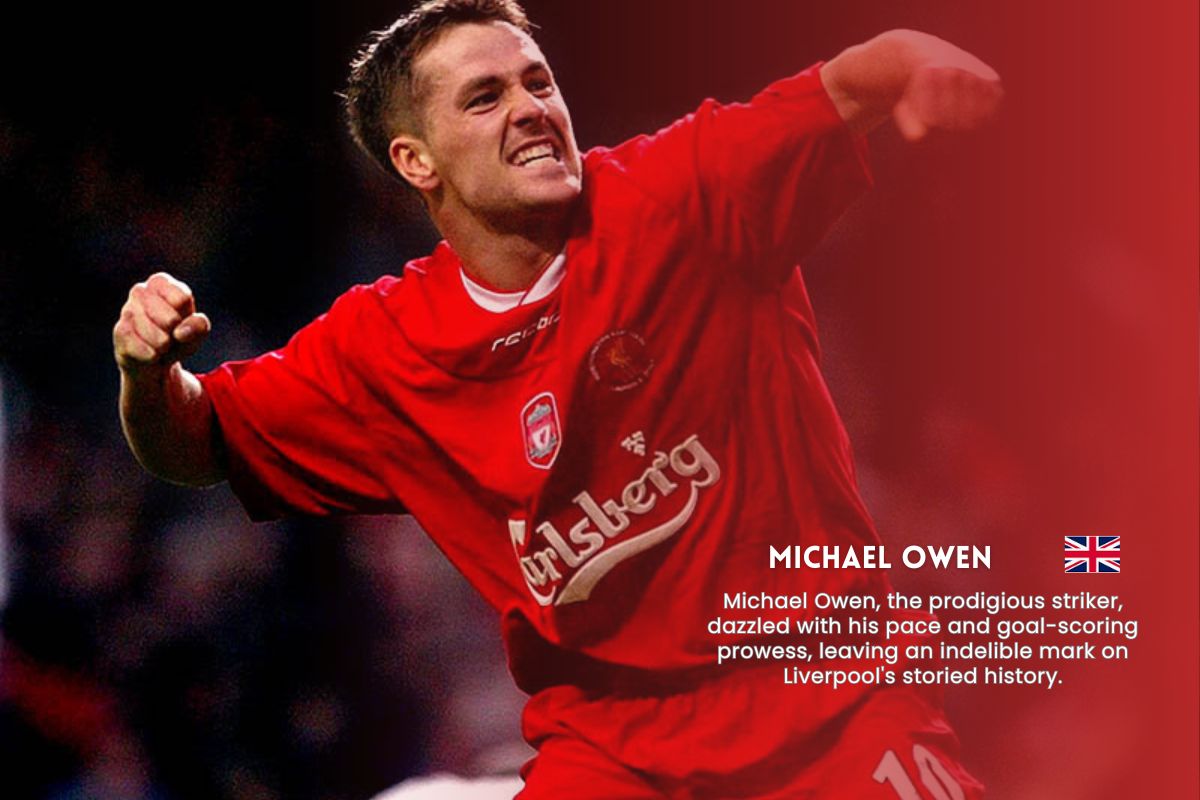
- DOB/Age: 14th Dec 1979: 44 years old
- Nationality: British
- Height: 1.73m
- Position: Forward
- Signed/Debut: May 23, 1996; Liverpool FC; £8m
Michael Owen’s time at Liverpool FC was nothing short of legendary. From bursting onto the scene as a teenage sensation to becoming a prolific goal-scorer and winning multiple trophies, Owen left an indelible mark on the club’s history. His lightning pace, clinical finishing, and numerous accolades, including the Ballon d’Or, cemented his status as one of Liverpool’s greatest-ever players. Let’s delve deeper into Owen’s journey at Liverpool, exploring his breakthrough, remarkable achievements, and unforgettable moments in the famous red shirt.
Early Life and Career
Michael Owen was born on December 14, 1979, in Chester, Cheshire, to Jeanette and Terry Owen. With a footballing lineage, owing to his father’s career as a professional footballer for clubs like Chester City and Everton, he was introduced to the sport at a young age. His talent quickly became apparent as he excelled in youth football, breaking records and catching the attention of scouts from an early age.
Michael Owen’s journey to professional football began when he signed with the Liverpool youth team at the age of 12. Under the guidance of Steve Heighway, he progressed through the ranks, showcasing his exceptional goal-scoring abilities. Despite his young age, Owen’s performances for Liverpool’s youth teams and his prolific scoring record earned him recognition as one of the most promising talents in English football. Throughout his early career, Owen’s determination and natural talent propelled him forward, setting the stage for his illustrious career ahead.
Career at Liverpool
Michael Owen’s arrival at Liverpool marked the beginning of an era characterized by his electrifying pace and clinical finishing. He was signed by Liverpool from the youth academy of his hometown club, Chester City, for a reported fee of £8 million, a British record for a player under the age of 20 during that season. His playing style, characterized by his explosive speed and deadly instincts in front of goal, transformed Liverpool’s attacking dynamics. Former Liverpool manager Gerard Houllier once described Owen as having “the pace of a cheetah and the heart of a lion,” highlighting the dual threat he posed to opposition defenses.
Tactically, Michael Owen’s role as a striker often saw him leading the line alongside another forward or operating as a lone striker, depending on the formation deployed by the manager. His partnership with strike partner Emile Heskey in the top premier league wins was particularly formidable, with their contrasting styles complementing each other perfectly. His ability to exploit space behind defensive lines made him a nightmare for defenders to handle, often drawing them out of position and creating openings for teammates.
Beyond his goal-scoring prowess, Michael Owen’s leadership qualities shone through on numerous occasions. One notable example came during the 2001 FA Cup final against Arsenal. With Liverpool trailing 1-0 late in the game, Owen’s leadership and determination inspired a dramatic comeback, scoring two late goals to clinch victory for his team. This match exemplified Owen’s ability to rise when his team needed him most, cementing his status as one of the Liverpool legends.
Achievements, Moments, and Performances
Michael Owen’s time at Liverpool was defined by numerous memorable moments, record-breaking achievements, and match-winning performances that solidified his status as one of the club’s greatest-ever players. One of his standout performances came in the 2001 FA Cup final against Arsenal, where he single-handedly turned the game on its head with two late goals to secure a 2-1 victory for Liverpool. His electrifying pace and clinical finishing were on full display as he first latched onto a through ball before calmly slotting past the goalkeeper to equalize. Then, in the dying moments of the game, Michael Owen produced a moment of magic, weaving past Arsenal’s defenders before rifling a shot into the bottom corner to clinch the cup for Liverpool.

His ability to perform in crucial situations was further exemplified during Liverpool’s UEFA Cup campaign in 2000-2001. In the quarter-final tie against Porto, Owen scored a crucial away goal in the first leg, helping Liverpool secure a 2-0 victory on aggregate and progress to the next round. His knack for scoring important goals continued in the semi-final against Barcelona, where he netted a brace in the second leg to secure Liverpool’s place in the final.
Throughout his Liverpool career, Michael Owen set numerous records and achieved remarkable milestones. In the 1997-1998 season, he became the youngest player to score a hat-trick in the Premier League at 18 years and 143 days old. Additionally, Owen’s goal-scoring exploits helped Liverpool secure a historic treble in the 2000-2001 season, winning the FA Cup, League Cup, and UEFA Cup. Beyond his accolades, Owen’s impact on the team extended far beyond the stat sheet. His leadership on the pitch and ability to inspire his teammates were invaluable assets to Liverpool. Former Liverpool captain Steven Gerrard once hailed Owen as “the ultimate big-game player,” emphasizing his ability to rise to the occasion when it mattered most.
Legacy and Impact
Michael Owen’s legacy at Liverpool extends far beyond his playing days, leaving an indelible mark on the club’s history and culture. As one of the most prolific goal-scorers in Liverpool’s history, Owen’s name is synonymous with success and glory at Anfield. His influence on younger players is evident in the way he inspired future generations of Liverpool stars to emulate his style of play and strive for excellence on the pitch. Additionally, Owen’s electrifying performances captivated fans around the world, drawing new supporters to the club and solidifying Liverpool’s status as a global footballing powerhouse.

Owen’s contributions to Liverpool were duly recognized with numerous awards and accolades, including the prestigious Ballon d’Or in 2001, making him the first Liverpool player since Kevin Keegan to receive the honor. His enduring impact on Liverpool’s rich footballing heritage cements his place as a true legend of the club.
Life after Liverpool and Personal Life
After departing Liverpool, Michael Owen continued his football journey with stints at several clubs, including Real Madrid, Newcastle United, Manchester United, and Stoke City. While injuries somewhat hampered his later years, Owen still showcased moments of brilliance on the pitch. Post-retirement, Owen transitioned into a career in punditry and commentary, providing insightful analysis on various football platforms. Additionally, he has authored several books and columns, offering his perspective on the game he loves. Outside of football, Owen has been involved in various philanthropic endeavors, supporting charities such as UNICEF and the NSPCC. His contributions off the field highlight his commitment to making a positive impact on society beyond the realm of sports.
In his personal life, Owen is known for his love of horse racing, having owned and bred racehorses. He also enjoys spending time with his family and is actively involved in community initiatives aimed at promoting youth development and well-being. Overall, Michael Owen’s post-football career reflects his dedication to both the sport and broader societal issues, leaving a lasting legacy that extends beyond the football pitch.
Conclusion
Michael Owen’s tenure at Liverpool FC was marked by moments of brilliance and unforgettable performances. His lethal goal-scoring ability and on-field leadership endeared him to fans and solidified his place in Liverpool’s storied history. As a legend and former player, Owen’s contributions inspire fans and players alike, leaving an indelible mark on the club’s legacy. He remains an iconic figure in the annals of Liverpool FC’s rich footballing history.
Read all other posts on Michael Owen
Find the Latest News on Player Ratings | Transfers | Prematch | Postmatch
Stay tuned for more updates on Liverpool FC Times and Stories. Your thoughts are always welcome in the comments section. Thank you for your continued support!
YNWA (You’ll Never Walk Alone)!
The Liverpool FC Times Team
LiverpoolFCTimes.com
